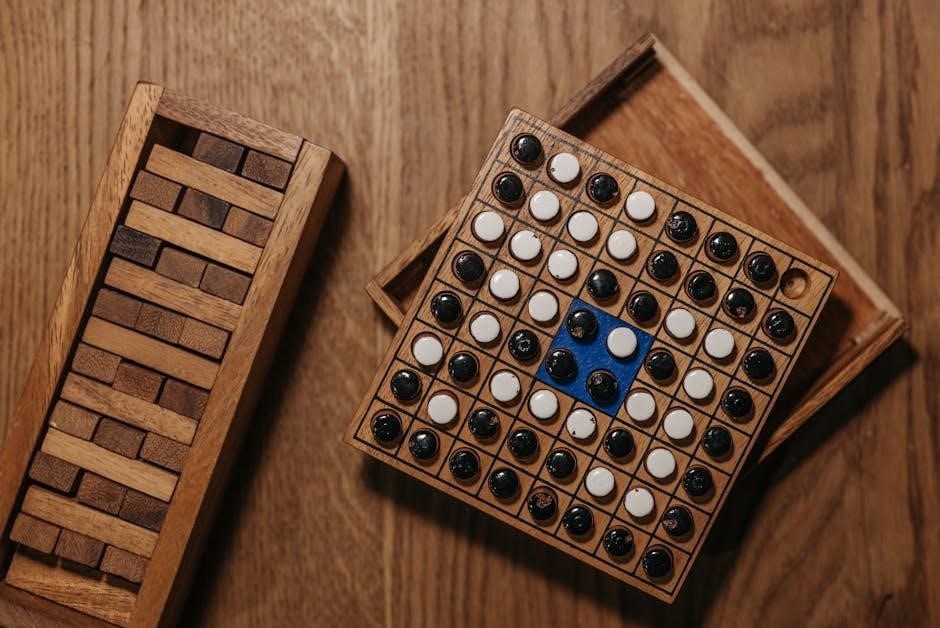Logical puzzles with answers PDFs offer engaging exercises to enhance critical thinking and problem-solving skills․ These printable resources include logic grids, Sudoku, Rebuses, and more, catering to all skill levels․ They provide step-by-step solutions, making them ideal for educational purposes or personal cognitive development․ Available for free download, these puzzles are perfect for teachers, students, and enthusiasts seeking to improve logical reasoning through fun and challenging activities․
What Are Logical Puzzles?

Logical puzzles are exercises designed to challenge reasoning, problem-solving, and critical thinking skills․ They present scenarios, patterns, or sequences that require deductive reasoning to uncover the solution․ Available in various forms, such as logic grids, Sudoku, Rebus puzzles, and number series, these puzzles are structured to test cognitive abilities and logical deduction․ Many logical puzzles are distributed in PDF formats, offering printable versions for easy access․ These resources often include answers, making them ideal for educational purposes or personal development․ Logical puzzles are popular in schools, competitive exams, and recruitment processes, as they assess analytical and computational thinking․ They cater to all age groups and skill levels, providing a fun and engaging way to enhance mental agility and sharpness․ Their versatility makes them a valuable tool for both entertainment and educational growth․
Importance of Logical Puzzles in Cognitive Development
Logical puzzles play a significant role in enhancing cognitive development by strengthening critical thinking, problem-solving, and analytical skills․ Engaging with these puzzles improves memory, attention, and processing speed, fostering mental agility․ They are particularly beneficial for children, as they introduce foundational concepts of logic and reasoning, preparing them for complex problem-solving in academics and real-life situations․ Adults also gain from these exercises, as they help maintain cognitive function and reduce the risk of mental decline․ The structured nature of logical puzzles, especially when accompanied by answers, allows learners to track progress and build confidence․ Incorporating these puzzles into educational curriculums or personal routines can lead to improved academic performance and enhanced career opportunities․ Their accessibility in PDF formats makes them a convenient tool for cognitive development across all age groups․

Types of Logical Puzzles
Logical puzzles come in various forms, including logic grids, Rebuses, number series, Sudoku, and logic riddles․ Each type challenges the mind differently, promoting critical thinking and problem-solving skills․ These puzzles are designed to engage learners of all ages, offering fun and intellectual stimulation while enhancing cognitive abilities․ The diversity of puzzle types ensures there is something for everyone, catering to different interests and skill levels․ Whether it’s pattern recognition, wordplay, or numerical sequences, logical puzzles provide an enjoyable way to sharpen mental acuity and boost confidence in logical reasoning․ They are also widely used in educational settings to teach computational thinking and analytical skills․ The structured nature of these puzzles makes them accessible and rewarding for all․
Logic Grid Puzzles
Logic Grid Puzzles are a popular category of logical puzzles that involve solving problems using grids and clues․ These puzzles typically present a scenario with several variables, such as people, places, or objects, and require solvers to deduce the correct arrangement by eliminating possibilities․ Logic Grid Puzzles are often included in PDF collections, making them easily accessible for printing and solving offline․ They are grouped by difficulty levels, ranging from very easy to very hard, ensuring that both beginners and experienced puzzlers can enjoy them․ Many Logic Grid Puzzle PDFs include answer keys, which are helpful for verifying solutions or learning from mistakes․ These puzzles are widely used in educational settings to teach critical thinking and deductive reasoning skills․ They are also a favorite among puzzle enthusiasts due to their structured yet challenging nature․ Solving Logic Grid Puzzles can be a fun and rewarding way to improve problem-solving abilities while enjoying a mental workout․
Rebus Puzzles
Rebus Puzzles are an engaging and creative type of logical puzzle that uses images, letters, numbers, and symbols to represent words, phrases, or expressions․ They rely on wordplay, puns, and double meanings, requiring solvers to think creatively to uncover the hidden message․ Available in PDF formats, these puzzles are easy to print and solve offline, with many collections including answer keys for easy verification․ Widely used in education, Rebus Puzzles help enhance critical thinking and linguistic skills among students, making them a valuable educational tool․ Adults also enjoy them as a fun and challenging mental exercise․ Solving these puzzles improves cognitive abilities by enhancing visual and linguistic reasoning, providing a stimulating mental workout․ Their broad appeal ensures they offer a fun and educational experience for people of all ages, catering to different skill levels and interests․

Number Series Puzzles
Number Series Puzzles are a popular type of logical puzzle that challenges individuals to identify patterns in sequences of numbers․ These puzzles require solvers to analyze the progression of numbers and determine the next logical number in the series․ Available in PDF formats, they often include answer keys, making them ideal for self-assessment and educational purposes․ Number Series Puzzles are commonly used in competitive exams, recruitment tests, and cognitive development exercises․ They enhance numerical reasoning, problem-solving skills, and critical thinking abilities․ Solving these puzzles helps improve concentration and memory, making them a valuable tool for both students and professionals․ With varying difficulty levels, from simple arithmetic sequences to complex patterns, Number Series Puzzles cater to a wide range of skill levels, ensuring a challenging and rewarding experience for all who attempt them․
Sudoku and Similar Number-Based Puzzles
Sudoku and similar number-based puzzles are highly popular logical exercises that require filling a grid with numbers according to specific rules․ In Sudoku, a 9×9 grid is divided into nine 3×3 subgrids, where each row, column, and subgrid must contain numbers from 1 to 9 without repetition․ These puzzles enhance problem-solving skills, logical reasoning, and focus․ Similar puzzles, such as Kakuro and Hidoku, offer variations on the theme, with unique rules and challenges․ Available in PDF formats with answers, these puzzles are widely used in educational settings, cognitive development, and recruitment assessments․ They cater to diverse skill levels, from beginners to advanced solvers, making them accessible and engaging for all ages․ Solving these puzzles regularly can improve mental agility and mathematical reasoning, making them a valuable tool for both entertainment and intellectual growth․

Logic Riddles and Brain Teasers

Logic riddles and brain teasers are engaging puzzles that challenge the mind to think creatively and logically․ These riddles often involve wordplay, patterns, or mathematical twists, requiring deductive reasoning to uncover the solution․ They are designed to stimulate critical thinking and problem-solving skills, making them popular for both entertainment and educational purposes․ Many logic riddles are short and straightforward, yet tricky, such as “I am where yesterday follows today” or “What has keys but can’t open locks?” These puzzles are widely used in classrooms, interviews, and competitive exams to assess logical reasoning and cognitive agility․ Available in PDF formats with answers, they provide a fun and effective way to sharpen mental acuity for people of all ages․ Solving these riddles regularly can enhance verbal reasoning, mathematical logic, and analytical thinking, making them a valuable tool for intellectual growth and development․

Benefits and Applications of Logical Puzzles

Logical puzzles enhance cognitive abilities like memory, attention, and processing speed․ They are widely used in educational settings and professional recruitment processes․ Versatile and engaging, they suit all ages and skill levels․
Enhancing Critical Thinking and Problem-Solving Skills
Logical puzzles are powerful tools for sharpening critical thinking and problem-solving abilities․ They require individuals to analyze patterns, deduce information, and make logical connections․ By engaging with these puzzles, users develop cognitive skills such as memory, attention, and processing speed․ The structured nature of puzzles like Sudoku and logic grids encourages systematic reasoning, helping individuals break down complex problems into manageable steps․ Regular practice enhances mental agility, fostering creativity and analytical thinking․ These skills are transferable to real-world scenarios, making logical puzzles a valuable resource for personal and professional growth․ Moreover, the inclusion of answers in PDF formats provides immediate feedback, allowing learners to identify mistakes and refine their strategies․ This iterative process reinforces learning and builds confidence in tackling challenging situations effectively․ Logical puzzles are thus a fun and effective way to improve cognitive function and problem-solving proficiency․
Educational Uses in Schools and Universities
Logical puzzles with answers PDFs are widely used in educational settings to promote learning and cognitive development․ Teachers and educators incorporate these resources into curricula to engage students in critical thinking activities․ PDFs containing logic grids, Sudoku, and Rebuses are particularly popular, as they cater to various age groups and skill levels․ These puzzles are often used in classrooms to teach problem-solving strategies and logical reasoning, aligning with subjects like mathematics and computing․ For instance, logic puzzles are integrated into KS2 and KS3 computing lessons to bridge critical thinking and computational logic․ The inclusion of answer keys allows teachers to track progress and provide feedback, while students can independently verify their solutions․ Additionally, universities use these puzzles to enhance analytical skills in higher-level courses․ Overall, logical puzzles with answers PDFs serve as versatile and effective educational tools, fostering intellectual growth and preparing students for academic challenges․
Role in Recruitment and Aptitude Tests
Logical puzzles with answers PDFs play a significant role in recruitment and aptitude tests, serving as effective tools for assessing candidates’ cognitive abilities․ Employers and testing organizations use these puzzles to evaluate critical thinking, problem-solving skills, and logical reasoning․ PDF resources, such as logic grids and number series puzzles, are often included in exams to gauge a candidate’s ability to analyze patterns and deduce solutions under time constraints․ These puzzles are particularly popular in technical and managerial recruitment, where analytical skills are paramount․ Answer keys provided in these PDFs enable quick and accurate evaluation of responses, ensuring transparent and fair assessment․ By incorporating logical puzzles into aptitude tests, organizations can identify individuals with strong reasoning abilities, making them valuable assets for problem-solving roles․ This method is efficient and cost-effective, streamlining the recruitment process․

How to Solve Logical Puzzles
To solve logical puzzles, start by understanding the pattern or rule․ Use elimination and deductive reasoning to narrow down possibilities․ Practice with PDF resources to sharpen your skills and master logical thinking through structured exercises and solutions․

Understanding Logic Grids and Patterns
Mastering logic grids and patterns is essential for solving logical puzzles․ Start by identifying the structure of the grid, which typically involves rows and columns with clues․ Analyze the given information to deduce possible answers, using elimination techniques to narrow down options․ Patterns often repeat or follow a sequence, so recognizing these can help you fill in the grid systematically․ For example, in a Sudoku puzzle, understanding that each number appears only once in each row, column, and subgrid is key․ Practice with free PDF resources, such as logic grids and Sudoku, to improve your ability to recognize and apply these patterns effectively․ Over time, this skill will enhance your critical thinking and problem-solving abilities, making you proficient in tackling even the most challenging puzzles․ Regular practice and reviewing solutions from PDF guides can further refine your approach and boost confidence․ By breaking down complex puzzles into manageable steps, you’ll become adept at deciphering logic grids and uncovering hidden patterns with ease․ This foundational skill is not only enjoyable but also beneficial for cognitive development and mental sharpness․ Embrace the challenge and enjoy the process of mastering these intellectual exercises․
Using Elimination and Deductive Reasoning
Elimination and deductive reasoning are cornerstone strategies for solving logical puzzles․ Start by eliminating impossible options to narrow down potential answers․ Deductive reasoning involves drawing conclusions based on given clues, ensuring each step logically follows the previous one․ For example, in logic grids, cross-referencing clues helps identify correct placements․ Practice with free PDF resources, such as logic grids and Sudoku, to refine these skills․ These techniques enhance cognitive abilities and mental sharpness, proving beneficial beyond puzzles․ Regular practice with downloadable PDFs can improve your proficiency in applying elimination and deduction effectively․ By systematically breaking down complex problems, you’ll master the art of logical reasoning and solve even the toughest puzzles with confidence․ These exercises are not only intellectually stimulating but also a fun way to sharpen your mind․ Embrace the challenge and enjoy the process of mastering these essential problem-solving techniques․

Leave a Reply
You must be logged in to post a comment.